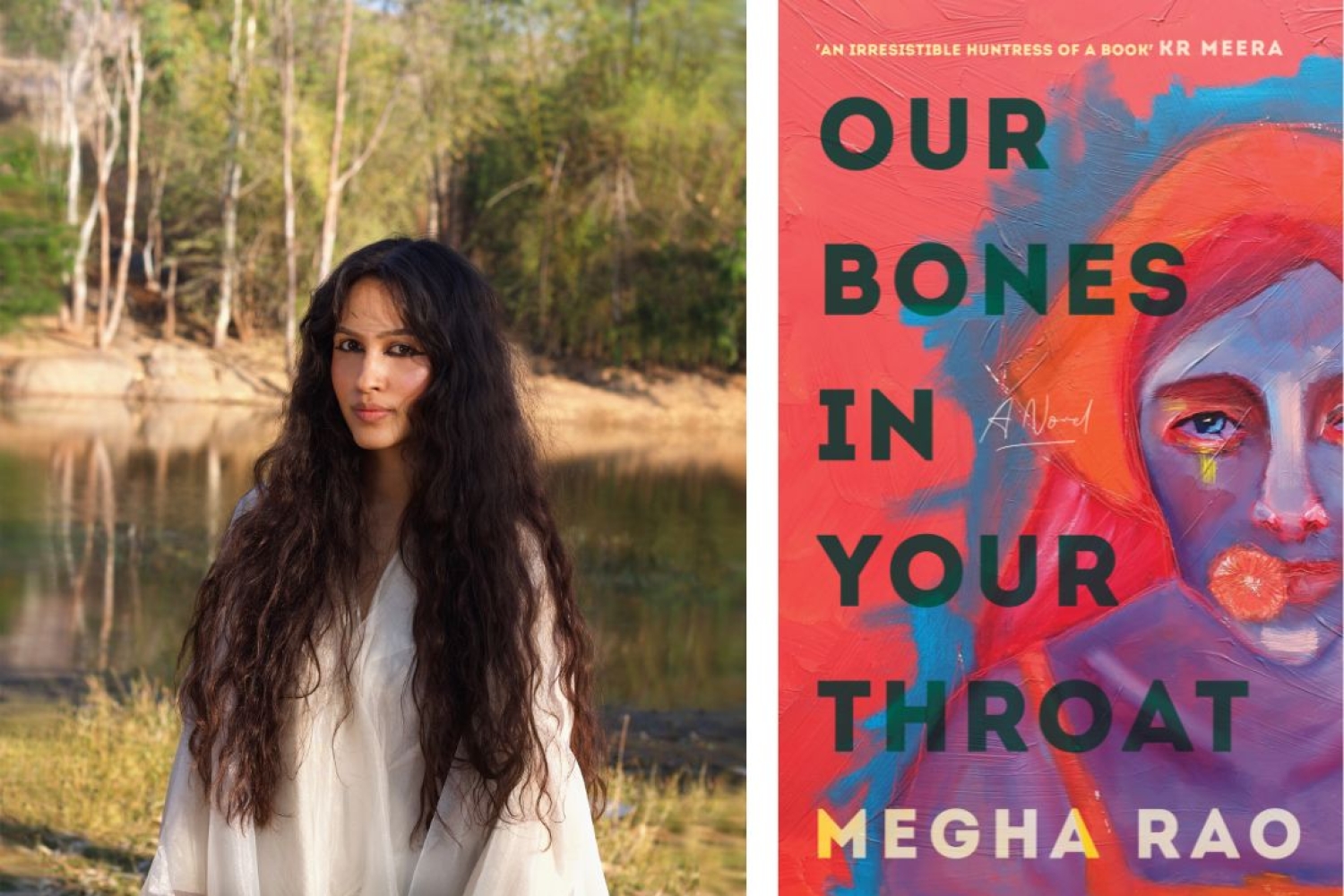

After enchanting people with her poetry performances and book, Kerala-born writer Megha Rao is ready to captivate wolves (her community of readers) with her new fiction, Our Bones in Your Throat. Set on a college campus in Mumbai, the novel follows Esai’s entry into the college filled with myths, lores, politics, friendship, love and abuse. Underneath the college affairs of the young, the novel makes an intricate web of history, mythology, and science—all in order to explore how stories and individuals are shaped.
We talk with Rao to learn about her shift to fiction, the world of college, and how history forms the personality of the novel.
You initially started with poetry. What prompted the shift to fiction, and how has your relationship with fiction evolved?
I actually started with zines/comics, and then in my teens, aggressively began writing short fiction. Poetry was something I fell into when I was a bit of a loser in college, and performing on stage came after. It’s a very chaotic trajectory. I couldn’t possibly explain my relationship with literary genres, but I explore them with the curiosity of a child and love all of them. I love their fluidity and complexity. And I love how the story picks the medium. I love that Teething had to be a collection of poems, and that Our Bones in Your Throat couldn’t have been anything but a novel. And a novel doesn’t possess the urgency of a poem, so it taught me patience. And it taught me to see the larger picture instead of hyper-focusing. See, poetry is a heart wound laid bare. But a novel is elusive and naughty. You get to see its emotional world, but it also wears a sheath of characters, landscapes, dialogues and plot twists. In fact, an entire civilisation is built above the heart.
The novel deals with physical abuse and we see how the character of Scheher is attached to her partner despite the abuse, what do you think contributes to one’s affair with abusive relationships?
Abuse distorts Scheher’s reality because she’s manipulated into believing lies about herself. What’s so sinister about abuse, apart from the abuse itself, is the contrast between how it presents itself to an outsider and how the victim experiences it. In the book, the narrator can’t make peace with Scheher’s choices because the truth is so jarringly obvious. But it’s not as simple as, ‘If she wanted to, she’d leave.’ Scheher is unable to comprehend the magnitude of her situation because the relationship didn’t start with abuse. The abuse started slowly, and then it was built up. And then it became familiar territory. And of course, we hold onto the familiar. Sometimes an abuser can even gaslight you into thinking you can’t survive without them. Honestly, there’s no one answer to what contributes to staying in an abusive dynamic or what lived experiences cause a person to become an abuser. Or how society enables it via victim blaming, misogyny and judgement instead of showing up with concern/compassionate curiosity.
What made you set the scene of the novel on a college campus and how does it shape your characters as individuals?
The college is a microcosm of the real world. You’re going to experience love, friendship, politics, betrayal and so much more. A lot of your identity also develops in college. Your social interactions on campus have a big impact on your self-concept and self-esteem. Esai, the narrator in Our Bones in Your Throat, finds herself grappling with competition, power struggle, isolation, ugly rumours, and even a mythical female spirit trying to befriend her. But what’s beautiful about both Esai and Scheher is the way they respond to adversity. They don’t bow down, they turn ferocious. And I love that for them.
Your book incorporates various historical stories and instances. What inspired you to include them, and how do they enhance the depth of your narrative?
The references are an integral part of this book’s personality. The allusion to the Salem witch trials, Jahanara’s lover being boiled, Anne Boleyn’s beheading, the trial of Kepler’s mother, all of it. But then the historical stories also make space for something equally potent: folklore. Oral storytelling traditions tell you so much about people’s beliefs and principles (I’m also reminded of Malcolm Gladwell’s mermaid episode in The Revisionist History podcast) They’re not just stories, they’re subconscious documentation of emotions, dreams, and livelihoods. And while Our Bones in Your Throat mentions local ghosts and deities like Neeli and Isakki Amman, it doesn’t limit itself to just transcending time and states of consciousness. It moves past the fringes of culture too. In fact, the book starts with sirens luring sailors to the altar of their deaths. All kinds of lore are relevant to this book. Every character’s actions and experiences are shaped by one ancient college rumour. And that’s why both history and myth are important to this story. Because how much of what we know is actually true? What biases, and skewed power dynamics led to something being told a certain way? We don’t need to find the answers right away. But we need to keep asking, yes.
Words Paridhi Badgotri
Photography P.E.L.L.A.
Date 03.08.2024